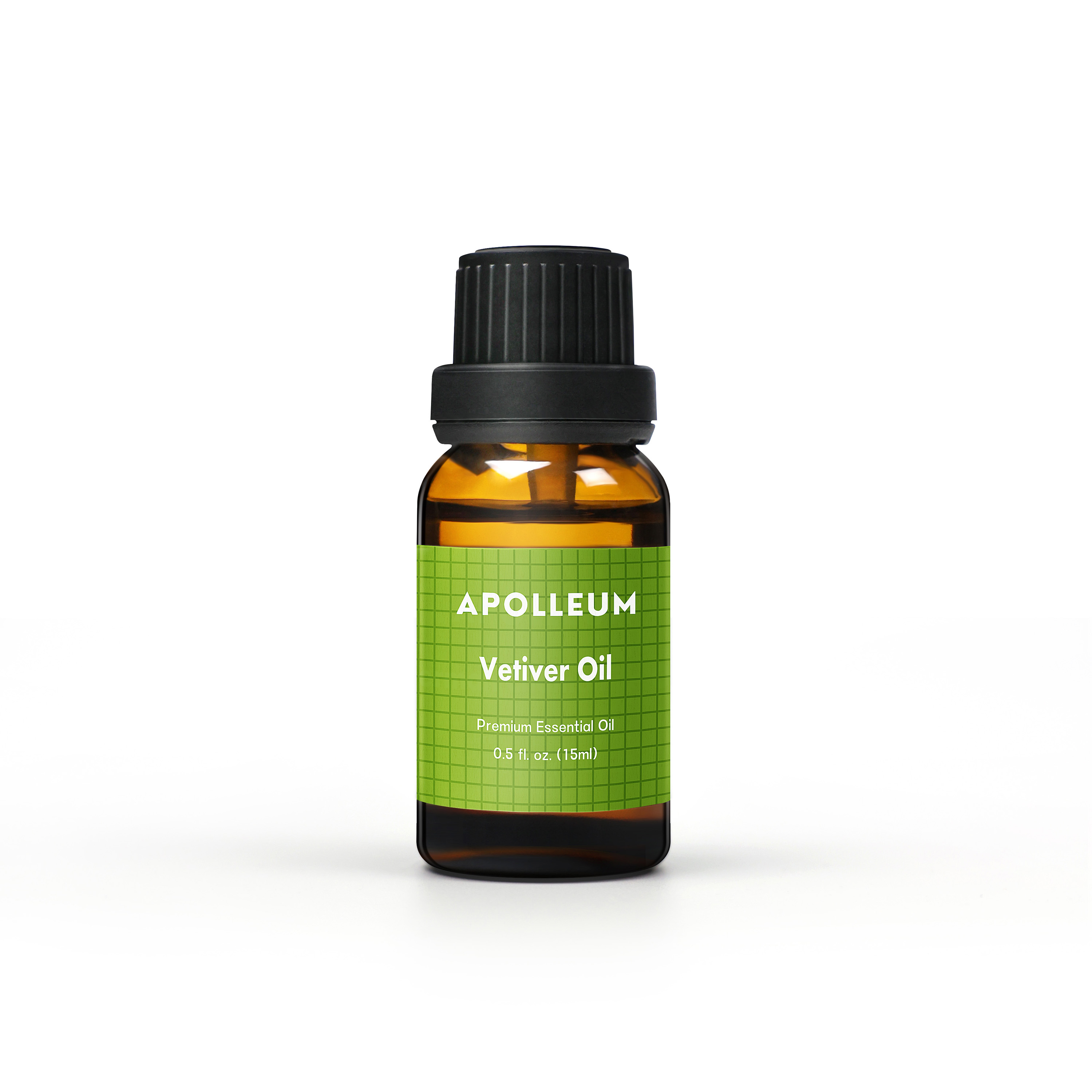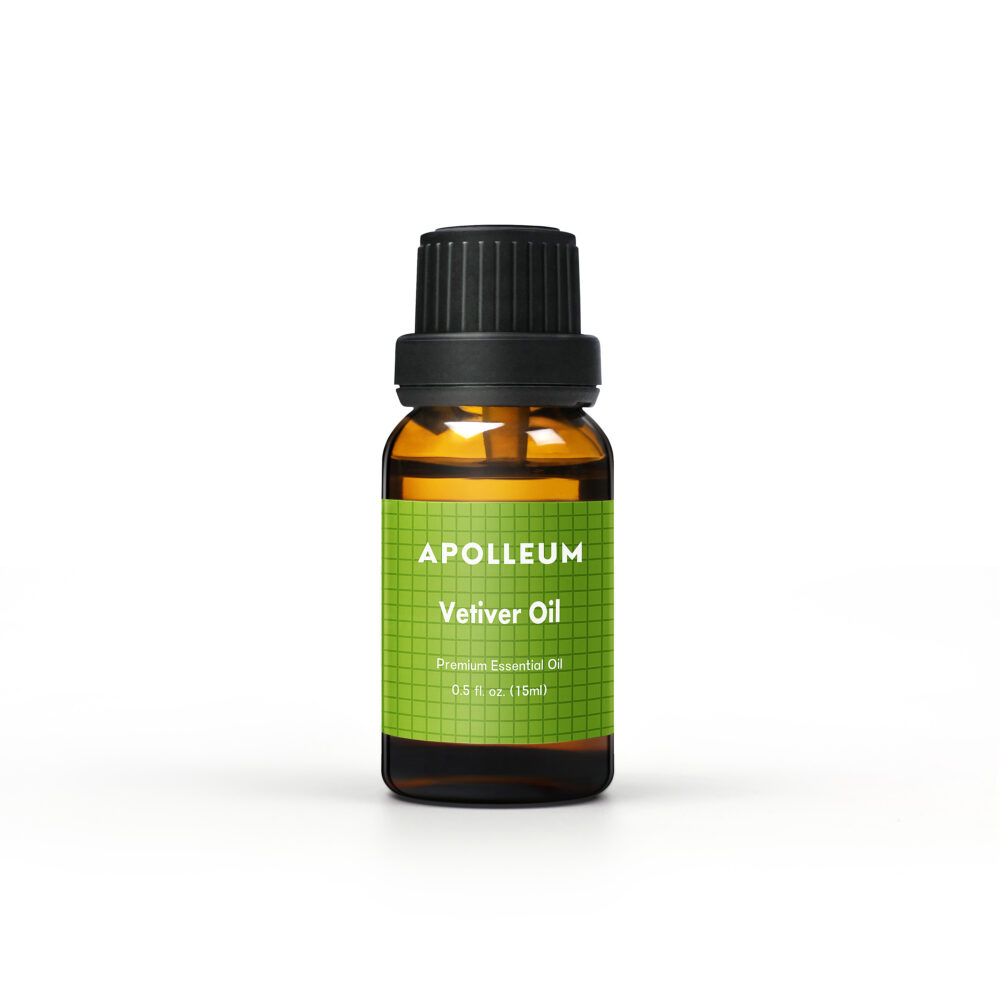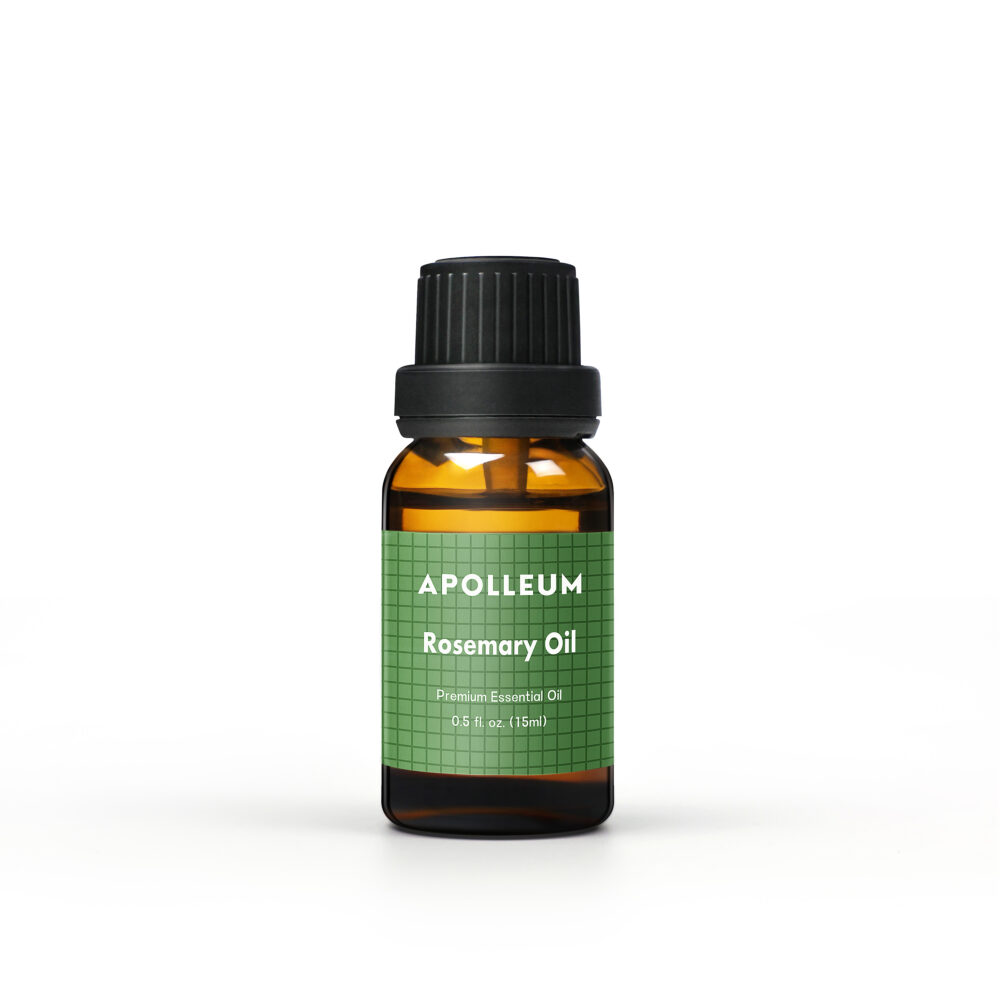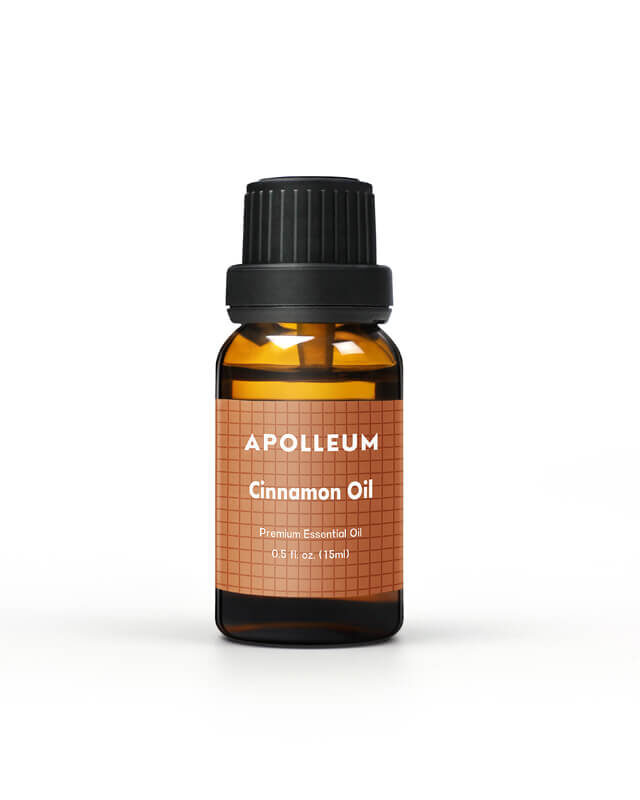


Vetiver Oil
$18.88
100% PURE VETIVER ESSENTIAL OIL
Discover the earthy and grounding allure of Apolleum’s vetiver oil. Carefully sourced, our vetiver oil releases a deep and rich fragrance, creating a sense of rooted tranquility. Elevate your senses and immerse yourself in the natural essence of vetiver. Transform your space into a haven of calm with Apolleum’s premium vetiver oil. Embrace grounding, shop now!
Size: 0.5 fl oz
Free shipping on orders over $50!
- No-Risk Money Back Guarantee!
- No Hassle Refunds
- Secure Payments
Description
- Manufacturing Method: distilled
- Part of Plant: Roots
- Main Chemotypes: Khusimol, Isovalencenol, Khusinol, beta Vetivenene
- Smells Like: dry, earthy, woody, leathery and smoky
Introduction to Vetiver Oil
Vetiver oil, derived from the roots of the Vetiveria zizanioides plant, is a precious essential oil with a rich history and diverse range of uses. Let’s explore the fascinating world of vetiver oil and delve into its origins, composition, and therapeutic properties.
What is Vetiver Oil?
Vetiver oil, also known as khus oil, is extracted through steam distillation from the fibrous roots of the vetiver plant, a perennial grass native to India and other tropical regions. It is characterized by its deep, earthy aroma with hints of woodiness and smokiness, making it a prized ingredient in perfumery, aromatherapy, and natural medicine.
Brief History and Origins
Vetiver has been cultivated and revered for centuries in regions where it is native, such as India and Indonesia, for its myriad of uses and cultural significance:
- Traditional Medicine: In Ayurvedic and traditional Chinese medicine, vetiver has been used for its cooling and grounding properties to treat various ailments, including fevers, inflammation, and anxiety.
- Perfumery: Vetiver oil has a long history in perfumery, valued for its complex aroma and fixative qualities. It is often used as a base note in fragrances to add depth and longevity.
- Soil Conservation: Vetiver grass is also prized for its ability to prevent soil erosion, making it a valuable crop in agriculture and land rehabilitation projects.
Chemical Composition and Aromatherapy Properties
Vetiver oil contains a complex array of chemical constituents that contribute to its therapeutic effects:
- Sesquiterpenes: Vetiver oil is rich in sesquiterpenes such as vetiverol and vetiverone, which impart its distinctive earthy aroma and grounding properties.
- Calming and Balancing: Vetiver oil is renowned for its calming and balancing effects on the mind and emotions. It is often used in aromatherapy to promote relaxation, reduce stress, and improve focus and concentration.
- Skin Care: Vetiver oil also has skincare benefits, including its ability to soothe irritation, balance sebum production, and promote the regeneration of skin cells, making it a valuable ingredient in skincare formulations.
What is Vetiver Oil?
Vetiver oil is a precious essential oil extracted from the roots of the Vetiveria zizanioides plant, also known as vetiver grass or khus grass. Let’s explore the definition of vetiver oil and the meticulous extraction process that yields this aromatic elixir.
Definition
Vetiver oil is a highly aromatic essential oil characterized by its deep, earthy scent with undertones of woodiness and smokiness. It is prized for its complex aroma and versatile therapeutic properties, making it a valuable ingredient in perfumery, aromatherapy, and natural medicine.
Extraction Process
The extraction of vetiver oil is a labor-intensive process that involves several steps to capture the aromatic essence of the plant’s roots:
- Harvesting: Vetiver grass is cultivated in tropical regions, where it grows in dense clumps with long, fibrous roots. The roots are harvested by hand, typically after the plant has reached maturity.
- Cleaning: After harvesting, the roots are thoroughly cleaned to remove dirt, debris, and other impurities.
- Chopping: The cleaned roots are then chopped into smaller pieces to facilitate the extraction process and increase the surface area for steam distillation.
- Steam Distillation: The chopped vetiver roots are placed in a distillation chamber, where they are exposed to pressurized steam. The steam causes the volatile aromatic compounds in the roots to evaporate and rise through the distillation apparatus.
- Condensation: As the steam rises, it passes through a condenser, where it cools and condenses back into a liquid state. The resulting mixture of water and vetiver oil is collected in a receiving vessel.
- Separation: Vetiver oil, being less dense than water, naturally separates and floats on the surface of the collected liquid. It is then carefully siphoned off and transferred to storage containers.
- Filtration: The extracted vetiver oil may undergo filtration to remove any remaining impurities or plant matter, resulting in a pure and potent essential oil ready for use.
History and Origin
Vetiver oil has a rich history that spans centuries, with its origins rooted in ancient cultures and civilizations. Let’s explore the ancient use of vetiver and its modern discovery, tracing the journey of this aromatic treasure through time.
Ancient Use
- Ancient Civilizations: Vetiver has been cultivated and revered for its aromatic and medicinal properties since ancient times. It was prized by civilizations such as the Egyptians, Greeks, and Romans for its fragrance and therapeutic benefits.
- Sacred Rituals: In ancient cultures, vetiver was often used in religious ceremonies, rituals, and embalming practices due to its grounding and purifying qualities. It was believed to promote spiritual awareness, clarity of mind, and emotional balance.
- Traditional Medicine: Ayurvedic and traditional Chinese medicine systems utilized vetiver for its cooling, calming, and rejuvenating properties. It was used to treat a variety of ailments, including fevers, inflammation, and nervous disorders.
Modern Discovery
- Colonial Era: Vetiver’s popularity spread during the colonial era when European explorers and traders brought it back to their homelands. Its distinctive aroma and therapeutic properties captivated perfumers, herbalists, and scientists alike.
- Scientific Research: In the 20th century, scientific research into the chemical composition and therapeutic effects of vetiver oil expanded our understanding of its potential benefits. Studies revealed its antimicrobial, anti-inflammatory, and stress-relieving properties, sparking renewed interest in its use.
- Modern Applications: Today, vetiver oil is widely used in perfumery, aromatherapy, skincare, and natural medicine. It is prized for its deep, earthy aroma and versatile therapeutic properties, making it a staple in essential oil collections around the world.
Chemical Composition of Vetiver Oil
Vetiver oil boasts a complex chemical composition comprising various aromatic compounds that contribute to its distinctive aroma and therapeutic properties. Let’s explore the key components found in vetiver oil:
Key Components
Vetiverol: Vetiverol is one of the primary components of vetiver oil, responsible for its deep, earthy scent. It possesses calming and grounding properties, making it a valuable contributor to the overall aroma and therapeutic effects of vetiver oil.
Vetiverone: Another significant component of vetiver oil is vetiverone, which contributes to its woody and smoky notes. Vetiverone is known for its sedative and stress-relieving properties, making it an essential part of vetiver oil’s aromatic profile.
Sesquiterpenes: Vetiver oil contains a high concentration of sesquiterpenes, including β-vetivone, α-vetivone, and khusimol. These compounds contribute to vetiver oil’s rich, complex aroma and offer various therapeutic benefits, such as anti-inflammatory, antifungal, and antimicrobial properties.
Sesquiterpenoids: Sesquiterpenoids are another group of compounds found in vetiver oil, including vetiselinenol and khusimone. These compounds contribute to the overall aroma profile of vetiver oil and may possess antioxidant and skin-rejuvenating properties.
Alcohols and Esters: Vetiver oil also contains a small percentage of alcohols and esters, such as β-vetivene and vetivenyl vetivenate. These compounds contribute to the oil’s viscosity and may enhance its stability and shelf life.
Benefits of Vetiver Oil
Vetiver oil offers a wide range of therapeutic benefits, from promoting relaxation and stress relief to enhancing skincare and serving as a natural insect repellent. Let’s explore the diverse applications of vetiver oil in aromatherapy, skincare, stress relief, and insect repellency:
Aromatherapy
- Calming and Grounding: Vetiver oil is prized in aromatherapy for its calming and grounding properties. Its deep, earthy aroma helps soothe the mind, alleviate feelings of anxiety and nervousness, and promote relaxation and emotional balance.
- Mood Enhancement: Diffusing vetiver oil in the air creates a serene and tranquil atmosphere, making it ideal for meditation, mindfulness practices, or simply unwinding after a long day. Its comforting scent can uplift the spirits and enhance overall well-being.
Skincare
- Skin Rejuvenation: Vetiver oil is beneficial for the skin, thanks to its regenerative and nourishing properties. It helps promote cell regeneration, improve skin elasticity, and reduce the appearance of scars, blemishes, and stretch marks.
- Balancing Sebum Production: Vetiver oil is suitable for all skin types and can help balance sebum production, making it beneficial for both oily and dry skin conditions. It moisturizes dry skin without clogging pores and regulates oil production in oily skin.
Stress Relief
- Relaxation and Tranquility: Vetiver oil is a natural remedy for stress relief and relaxation. Its grounding aroma helps calm the mind, reduce tension, and promote a sense of tranquility and inner peace, making it an excellent choice for relieving stress and anxiety.
- Sleep Aid: Diffusing vetiver oil before bedtime can promote restful sleep by creating a soothing environment conducive to relaxation and deep rest. Its sedative properties help quiet the mind and prepare the body for a restorative night’s sleep.
Insect Repellent
- Natural Insect Repellent: Vetiver oil contains natural insect-repelling compounds that make it an effective alternative to synthetic insect repellents. Its earthy aroma acts as a deterrent to mosquitoes, flies, and other insects, making it a valuable addition to outdoor activities and camping trips.
- Safe and Non-Toxic: Unlike chemical insect repellents, vetiver oil is safe for use around children and pets and does not pose risks to the environment. It provides natural protection against insect bites without the use of harmful chemicals or synthetic fragrances.
How to Use Vetiver Oil
Vetiver oil can be used in various ways to harness its therapeutic benefits and aromatic allure. Let’s explore three popular methods of using vetiver oil: diffusion, topical application, and bathing.
Diffusion
- Diffuser: Add 3-5 drops of vetiver oil to a diffuser filled with water. Turn on the diffuser and let the gentle mist disperse the aromatic molecules into the air. Vetiver oil’s deep, earthy aroma will create a serene and tranquil atmosphere, perfect for relaxation, meditation, or unwinding after a long day.
- Blends: Combine vetiver oil with complementary essential oils such as lavender, bergamot, or cedarwood for a customized aroma blend. Experiment with different ratios to create your signature scent that suits your mood and preferences.
Topical Application
- Dilution: Vetiver oil is potent and should be diluted with a carrier oil before applying it to the skin. Mix 2-3 drops of vetiver oil with 1 teaspoon of carrier oil such as coconut oil, jojoba oil, or sweet almond oil.
- Massage: Use the diluted vetiver oil blend to massage onto the skin, focusing on areas of tension or discomfort. The calming and grounding properties of vetiver oil help soothe muscles, reduce stress, and promote relaxation.
- Skincare: Incorporate vetiver oil into your skincare routine by adding a few drops to your moisturizer, serum, or facial oil. Vetiver oil’s skin-rejuvenating properties help improve skin tone, reduce the appearance of scars, and promote a healthy complexion.
Bathing
- Aromatherapy Bath: Add a few drops of vetiver oil to a warm bath and swirl the water to disperse the oil evenly. Soak in the aromatic bath for 20-30 minutes to relax muscles, calm the mind, and unwind after a stressful day.
- Foot Soak: Create a luxurious foot soak by adding vetiver oil to a basin of warm water. Soak your feet for 15-20 minutes to soothe tired feet, alleviate tension, and promote overall relaxation.
Safety Precautions
While vetiver oil offers numerous health benefits, it’s essential to use it safely and be aware of potential risks, particularly related to dilution and allergies. Let’s discuss some safety precautions to ensure the safe use of vetiver oil:
Dilution
- Always Dilute: Vetiver oil is potent and should always be diluted with a carrier oil before applying it to the skin. Mix 2-3 drops of vetiver oil with 1 teaspoon of carrier oil such as coconut oil, jojoba oil, or sweet almond oil. This helps prevent skin irritation and sensitization.
- Patch Test: Perform a patch test before using vetiver oil topically, especially if you have sensitive skin or are using it for the first time. Apply a small amount of diluted vetiver oil to a small area of skin and wait 24 hours to check for any adverse reactions before applying it more extensively.
Allergies
- Allergic Reactions: Some individuals may be allergic to vetiver oil or its components. If you have a known allergy to grasses or essential oils, exercise caution when using vetiver oil and consult a healthcare professional before use.
- Sensitivity: Individuals with sensitive skin may experience skin irritation or allergic reactions when using undiluted or improperly diluted vetiver oil. Always dilute vetiver oil with a carrier oil before applying it to the skin to minimize the risk of adverse reactions.
Popular Blends and Recipes
Vetiver oil blends harmoniously with a variety of other essential oils, creating delightful aromatic compositions with enhanced therapeutic benefits. Let’s explore two popular blends and recipes featuring vetiver oil:
Relaxing Blend
Ingredients:
- 3 drops Vetiver Oil
- 3 drops Lavender Oil
- 2 drops Bergamot Oil
- 1 drop Frankincense Oil
- 1 tablespoon Carrier Oil (such as coconut oil or sweet almond oil)
Instructions:
- In a small glass bottle, combine the vetiver oil, lavender oil, bergamot oil, and frankincense oil.
- Add the carrier oil of your choice to the bottle and mix well to blend the oils together.
- Use the relaxing blend for aromatherapy by adding a few drops to a diffuser and enjoying the soothing aroma.
- Alternatively, dilute the blend further and apply it to pulse points or the back of the neck for relaxation and stress relief.
- Store the blend in a cool, dark place away from direct sunlight to preserve its potency.
Skincare Blend
Ingredients:
- 2 drops Vetiver Oil
- 2 drops Frankincense Oil
- 2 drops Lavender Oil
- 1 drop Tea Tree Oil
- 1 tablespoon Jojoba Oil
Instructions:
- In a small glass bowl, combine the vetiver oil, frankincense oil, lavender oil, and tea tree oil.
- Add the jojoba oil to the bowl and mix well to blend the oils together.
- Apply the skincare blend to clean, dry skin as a facial serum or moisturizer, focusing on areas of concern.
- Gently massage the blend into the skin using upward motions to promote absorption and circulation.
- Use the skincare blend daily as part of your skincare routine to nourish, hydrate, and rejuvenate the skin.
- Store the blend in a dark glass bottle with a tight-fitting lid to protect it from light and air.
Buying Guide
When purchasing vetiver oil, it’s essential to consider quality considerations and ensure authenticity to experience its full therapeutic benefits. Let’s explore some key factors to keep in mind when buying vetiver oil:
Quality Considerations
- Organic Certification: Look for vetiver oil that is certified organic, indicating that it has been produced without the use of synthetic pesticides or chemicals. Organic vetiver oil is free from harmful residues and ensures a higher quality product.
- Steam Distillation: Choose vetiver oil that has been extracted through steam distillation, the most common and reliable method of extracting essential oils from plant material. Steam distillation preserves the integrity of the oil’s chemical composition and therapeutic properties.
- Pure and Undiluted: Opt for vetiver oil that is pure and undiluted, without any additives or fillers. Pure vetiver oil offers maximum potency and effectiveness, allowing you to experience its full range of therapeutic benefits.
- Sustainable Sourcing: Consider purchasing vetiver oil from companies that practice sustainable sourcing and ethical harvesting methods. Sustainable sourcing helps protect the environment and ensures the long-term viability of vetiver cultivation.
- Transparency and Testing: Choose reputable brands that provide transparency about their sourcing, production, and testing processes. Look for vetiver oil that has undergone third-party testing for purity, potency, and authenticity.
Authenticity
- Source of Origin: Vetiver oil is primarily produced in countries such as India, Haiti, and Indonesia. Check the label or product description to ensure that the vetiver oil you’re purchasing is sourced from reputable regions known for high-quality vetiver cultivation.
- Aroma and Color: Authentic vetiver oil has a deep, earthy aroma with hints of woodiness and smokiness. It may vary in color from pale yellow to amber, depending on factors such as the extraction process and age of the oil. Avoid oils with synthetic or artificial fragrances.
- Reputation of the Seller: Purchase vetiver oil from trusted sellers with a reputation for selling high-quality essential oils. Read customer reviews and testimonials to gauge the authenticity and effectiveness of the product.
Storage and Shelf Life
Proper storage of vetiver oil is essential to maintain its potency and aroma over time. Let’s explore some techniques for storing vetiver oil and its expected shelf life:
Proper Storage Techniques
- Dark Glass Bottles: Store vetiver oil in dark glass bottles to protect it from exposure to light, which can degrade its aromatic compounds and reduce its effectiveness over time. Amber or cobalt blue glass bottles are ideal for preserving the quality of vetiver oil.
- Cool, Dark Place: Store vetiver oil in a cool, dark place away from direct sunlight and heat sources, such as windowsills or radiators. Exposure to heat and light can accelerate the oxidation process and shorten the shelf life of the oil.
- Tight-Fitting Lids: Ensure that the lids of the storage bottles are tightly sealed to prevent air from entering and oxidizing the oil. Oxygen exposure can cause vetiver oil to deteriorate and lose its therapeutic properties.
- Avoid Temperature Fluctuations: Avoid storing vetiver oil in areas where temperature fluctuations occur frequently, such as bathrooms or kitchens. Fluctuating temperatures can affect the stability of the oil and lead to deterioration.
- Keep Away from Air and Moisture: Minimize air and moisture exposure by keeping the storage bottles tightly sealed when not in use. Moisture can cause vetiver oil to degrade and lose its potency, while air exposure can accelerate oxidation.
Shelf Life Expectancy
- Typical Shelf Life: When stored properly, vetiver oil has a relatively long shelf life compared to other essential oils. It can remain potent and effective for up to 3-5 years or even longer, depending on factors such as storage conditions, quality of the oil, and frequency of use.
- Check for Signs of Degradation: Over time, vetiver oil may undergo changes in aroma, color, and consistency, indicating a decline in quality. Check for any signs of oxidation, such as a rancid or musty smell, or a change in color from pale yellow to brown.
- Perform a Sniff Test: If you’re unsure about the freshness of vetiver oil, perform a sniff test by inhaling the aroma. Fresh vetiver oil has a deep, earthy scent with hints of woodiness and smokiness. If the aroma seems off or unpleasant, it may be time to replace the oil.
Conclusion
In conclusion, vetiver oil stands as a versatile and potent essential oil with a myriad of therapeutic benefits and aromatic allure. From its rich history and origins to its complex chemical composition and diverse applications, vetiver oil offers a holistic approach to health, well-being, and sensory delight.
By exploring its benefits in aromatherapy, skincare, stress relief, and beyond, we can harness the power of vetiver oil to promote relaxation, rejuvenation, and balance in body, mind, and spirit. Whether diffused in the air, applied topically to the skin, or added to luxurious blends and recipes, vetiver oil invites us to experience its calming and grounding effects, enhancing our daily rituals and moments of self-care.





Reviews
There are no reviews yet.